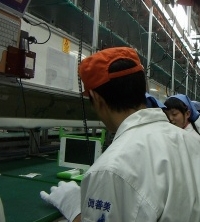One Laptop Per Child is now putting its finishing touches on the BTest-3 Children's Machine XO's and Quanta Computer Chairman Barry Lam couldn't be happier.
Quanta is the Original Design Manufacturer (ODM) of the OLPC computers and according to Deutsche Presse-Agentur, Chairman Barry Lam echoed Quanta President Michael Wang's earlier OLPC XO production announcement of an increase from 5 million to 10 million Children's Machine XO's for 2007 at Quanta's laptop manufacturing plant in Changshou, Jiansu Province, China
While we don't have word from Nicholas Negroponte on which countries are ordering the extra 5 million laptops, a great article on Mary Lou Jepsen, hints that countries might be buying more than the minimum 1 million units:
In June 2005, the OLPC team hadn't even finished its design when it found itself pitching the $100 laptop concept to the Brazilian government. Brazil immediately committed to 2 million units.At the current $150 laptop dollar price point, that translates into at least $300 million dollars that Brazil will pay directly to Quanta Computer for OLPC hardware. A small chunk of Quanta's 2007 revenue increase to $15 billion US dollars, up from $13.9 billion US dollars in 2006.
Might Quanta spend some of those OLPC Billions of dollars on its factory working conditions? I am Lorenz Matzat a freelance journalist and I ask if a philanthropic program like One Laptop Per Child will require Quanta Computer to produce millions of laptops under a pro-worker Code of Conduct.
Remember the turmoil about Apple's iPod produced under alleged harsh conditions in some Chinese High-Tech sweatshops? It is no secret, that the working conditions in China – nowadays dubbed as "the assembly line of world economy" - are harsh and poor. A recently published book Challenging the Chip - Labor Rights and Environmental Justice in the Global Electronics Industry" takes a detailed look.
In addition, a German research institute released a study about three computer hardware manufactures in the People's Republic of China: Social impacts of the production of notebook & PCs.
One of the companies examined, was Quanta. Though the study finds no sub-standard working conditions in Quanta's factories in China, the mostly young women at the assembly lines have to do hard work for small pay.
The study states, that in times of high demand, the workers have to do regular overtime – summing up their work hours to 60 hours a week. Monthly wages are between 65 and 80 US-Dollars, if that.
Quanta has already admitted it moved production to Changshu because it can pay workers 20% less in Jaingshu Province vs. China's coastal provinces.
Though nobody knows exactly how much money the non-profit organization OLPC earns with the XO, they should take care of the workers in its production. Paying higher and just wages would probably mean 50 cents more per laptop – it won't ruin the whole project.
But it would be very contradictory for a "philanthropic" project to lean on exploitation-like working conditions, especially at the risk of bad publicity like Apple's.
Rather, OLPC could strengthen its good standing in the public, taking sides with these workers, and act as a forerunner in establishing fair pay and healthy working conditions. It is very likely that Quanta doesn't want to loose the lucrative contract and would agree to a worker-respecting "code of conduct" from OLPC.




"Paying higher and just wages would probably mean 50 cents more per laptop"
Calculations please.
Ok. 10 Million laptops for FY 2007.
300 approx working days? (allowing for Sundays off. Some companies do a 6 day week, Some do a 5 day week).
Thats a little less than 34,000 laptops a day?
500 employees in the plant? Ok production line situation but thats like 70 per worker per day.
Some staff obviously dont do assembly. Typically 1/3 in production - 1/3 in adminstration - 1/3 in engineering?
So average wage would be maybe $1/Hour (US dollars) using an example factory I know of in a better part of China (ChangShou is known for its cheap labor - So possibly as low as 40c US/Hour).
Lets say 8 hour days (or shifts?).
300 days x $8/day?
Per worker thats $2400 per year x 500 workers.
So for a Factory of 500 thats a wages bill of 1.2 Million dollars (US) per year.
That works out to be a Labor/Laptop price of 12 US cents each.
Sounds cheap to me.
50c more per laptop would likely double their pay.
You're assuming a 500 worker factory can produce 10m laptops in a year. That's 1.2m hours, or 8 minutes of labor to produce each laptop. That sounds incredible to me.
"The Laptop Trail" June 9, 2005
http://online.wsj.com/public/article/SB111825761813954442-d4x_lQnm5A2GOO1NR6Wi_DBAyys_20050709.html?mod=blogs
"Quanta, which was founded in 1988 and started production in Shanghai in 2001, now has more than 90% of its output there, using more than 20,000 Chinese employees."
"Quanta made nearly a quarter of the roughly 49 million notebooks shipped last year"
Productivity may have improved in two years, but if it takes more than 20k workers to build 49m notebooks you'd expect it would take on the order of 4k workers to build 10m notebooks.
You need to look at common factory production worklines to truly appreciate how many workers it takes to manufacture products.
They most likely have in-house Printed Circuit Board and Pick-And-Place machines for board level assembly. Producing 30,000 PCBs PER DAY is a feat in itself...but its done by machine. They dont have women with soldering irons putting chips on boards.
The labor intensive part is putting the PCB in the plastic case and connecting cables to keyboard etc. Modern practice reduces assembly to click-in-place operations.
I think the figures for Quanta staff TOTAL does not take into account the actual number of people assembling. Remember - 1/3 in production - 1/3 in Administration - 1/3 in Engineering (as a rule of thumb).
But when its all said and done - without any concrete figures its all guesswork. I point out in my figures that labor-per-laptop must be less than 10 minutes.
You're agitating for the price of each laptop to rise by 50c to pay assembly line workers. Since the price of the laptop is paid by third world taxpayers, you're asking citizens of Brazil and Libya to pay more to workers from China. Why, exactly?
"Fair" trade is redundant; all trade is fair to both parties, or they would decline to trade. China has a well developed economy; if the Quanta plant was truly being unfair to its workers, they can work elsewhere. What you seem to think is unfair is that people in different parts of the world are paid different amounts for the same job. What's unfair about that? Bananas are always going to cost less where there are lots of banana trees; labor is going to be cheaper where there's lots of workers.
Do you think of it as unfair that someone can have a good life in China on US$80 per month? In Thailand, a reasonable salary is about 4000 baht/month, or just over US$100. In San Francisco you'd spend half that money just riding transit between home and work. I want to know when you're going to fix that. Isn't it unfair to San Franciscans that you can ride the bus to work in China or Thailand for much less than $1 per day? Let's pay less to San Francisco bus drivers to make it "fair" to everyone. Or does "fair trade" always require paying more money, not less money, for services? If so, why?
"Fairness" is subjective -- and subject to negotiation among the parties involved. You aren't involved in assembling laptops -- so don't be surprised if your concerns are ignored.
What if you have nothing but your labour, you have no choice but to trade that labour in order to access basic subsistance. That exchange is somehow "fair" by the logic applied above. John seems to thinks we all have equal access/power within the framework of capitalism.
If "[..] they can work elsewhere", why can't china's workers come to Johns' locale and "cheapen" the labour market in that area? Perhaps because the market isn't free at all, but controlled by geo-political forces that have a vested interest in keeping the majority of people without any other choice by to sell their labour for subsistance.